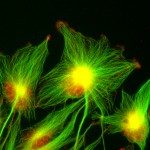Lien vers Pubmed [PMID] – 18198112
Med Sci (Paris) 2008 Jan;24(1):61-4
Polarity is a fundamental feature of all organisms both during development and in the adult. This reflects the key role of cell polarity during basic fundamental processes such as cell division, cell differentiation and cell migration. The control of cell polarity relies on functionally conserved proteins. Among these, Scribble, initially identified as a tumor suppressor gene in Drosophila, has been first involved in epithelial polarity. More recently Scribble function has been implicated in neuronal polarity and polarized cell migration. Scribble joins the growing family of tumor suppressors that play a key and conserved function in cell polarity. Scribble illustrates the more and more obvious link between regulation of cell polarity, cell transformation and tumor formation.

